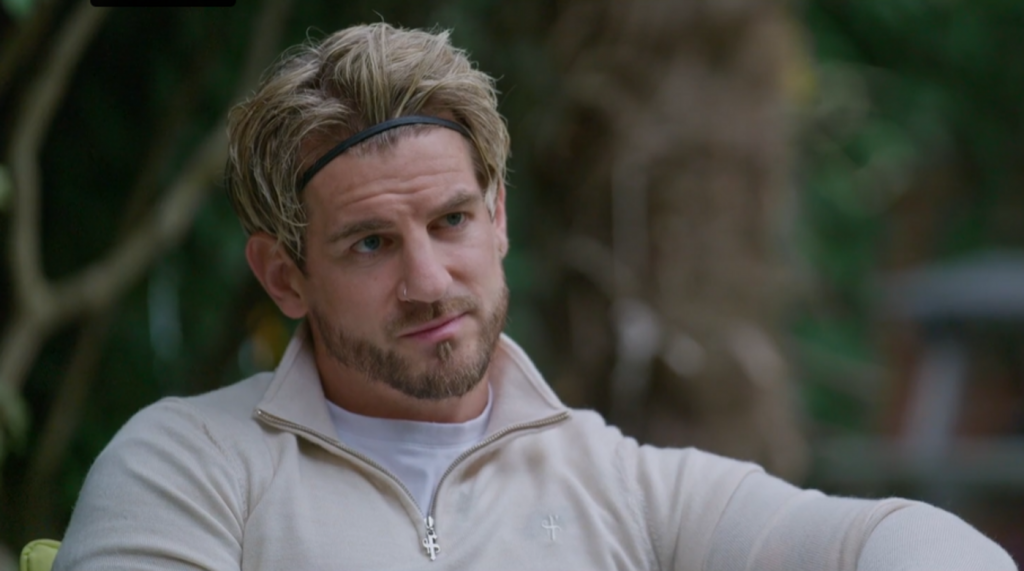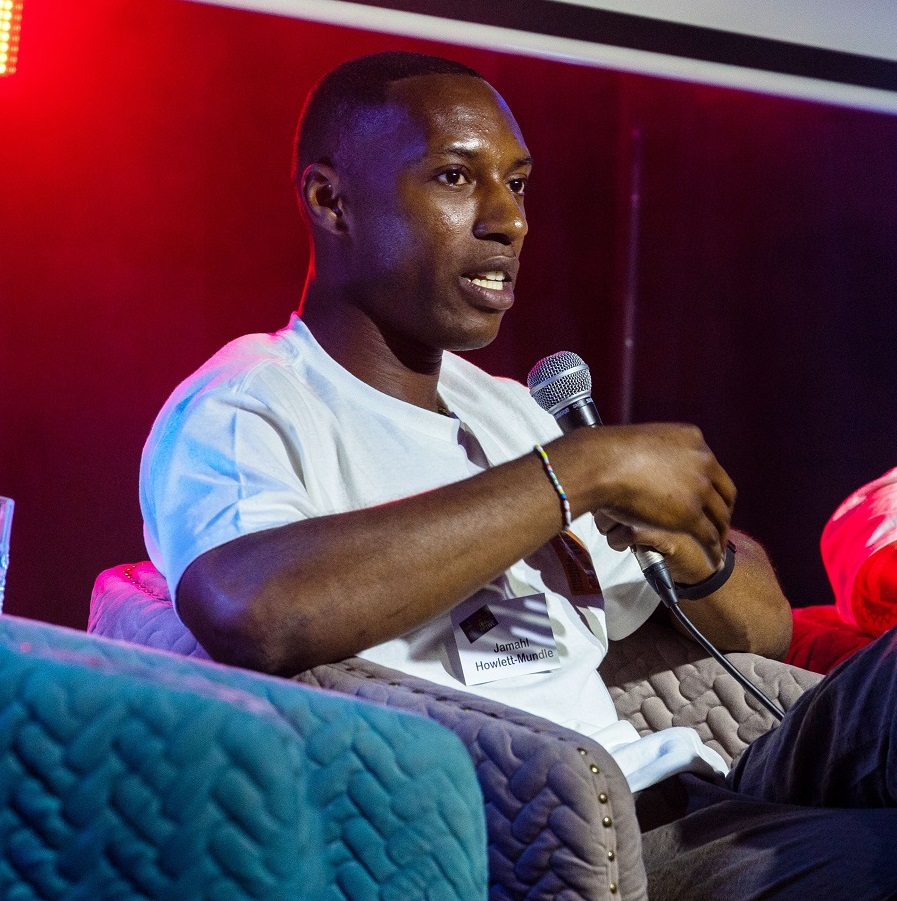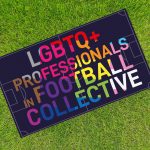‘I spent so long not allowing myself to know I was gay’: Matt Morton on the Football v Homophobia Podcast
The Thetford Town FC player-manager speaks on a new episode, after his appearances in TV documentaries ‘Rylan: Football, Homophobia and Me’ and ‘The Last Taboo’; Sevenoaks Town player Jahmal Howlett-Mundle, a fellow member of the LGBTQ+ Professionals in Football Collective, also appears in the programme; they join Jon Holmes for an in-depth conversation – listen now…

In The Guardian’s four-star review of ‘Rylan: Football, Homophobia and Me’, TV critic Jack Seale writes about Matt Morton’s chat with the presenter.
Filmed at the home of the Thetford Town player-boss, it follows on from scenes shot during a match at the Norfolk club’s 1,500-capacity stadium on a summer evening.
“Morton’s anecdote about the reaction of Thetford’s old-school, no-nonsense chairman Nigel Armes to the news of him coming out – Armes collared Morton in the club car park, put two hands on his shoulders and tearfully said how proud he was to have him at the club – is a story to swell the heart,” writes Seale.
The i paper also rated the TNT Sports / Buzz 16 documentary with four stars; The Manc gave the programme a glowing review; and articles with recommendations have appeared in The Athletic, Mail+ and The Mirror.
On a new episode of the Football v Homophobia Podcast, produced by Sports Media LGBT+ and available to listen to on Apple and Spotify, Morton is joined by another footballer who appears in the documentary – Sevenoaks Town centre-back Jahmal Howlett-Mundle – to give their reflections after its premiere.
The duo ply their trade in the eighth and ninth tiers of the pyramid but apart from Blackpool FC teenager Jake Daniels – currently on loan at seventh-tier Bradford Park Avenue – they are the highest-profile out gay and bi men playing football in England.
Morton tells podcast host Jon Holmes that since shooting the documentary with Rylan, he has spoken to his club chairman again about how coming out back in 2020 changed him.
“He [Armes] was talking about how much more relaxed I am,” he explains. “From conversations that I’ve had with him since shooting, he means I’m less aggressive, less abrupt, less short-tempered.
“I’ve still got all of those things – that’s my character – but the trigger is probably later than it was prior to that.
“What’s really interesting about that in my story in particular is that I spent so long not even knowing, or allowing myself to know, that I was gay.
“All of that aggression, if you like, that defence mechanism – that ‘I’m gonna get you before you get me’ – was almost a subconscious armour that I wore for a long period of time.
“It’s really interesting, psychologically, how those things work.”
The documentary is often at its most insightful when it delves into mental health.
In one scene, Rylan himself opens up to a clinical psychiatrist and talks about the “armour” that he wears as a well-known celebrity to protect himself from “chronic stress”.
At certain times, such as when he goes to watch West Ham and one or two people decide to hurl homophobic slurs at him, it helps to create a separation and he is less likely to take it to heart.
In an ideal world, of course, he wouldn’t have to endure such abuse – but this form of discrimination is still rearing its ugly head, particularly on social media.
After the documentary first aired, Rylan put up posts that showed some of the anti-gay comments sent to him online.
Calling out hate is an ongoing focus of the Football v Homophobia campaign, which is marking its annual Month of Action in February.
The social platforms are getting increasingly toxic, and statistics show a spike in reports of anti-LGBTQ+ discrimination in grassroots football.
Some county FAs including Lincolnshire and Surrey have been highlighting this escalation in recent weeks but in relative terms, there has been little mention from the major football authorities.

Howlett-Mundle believes the message needs to be communicated better.
“The more people that are reporting these instances of abuse, the more traction it’s going to get,” he says on the podcast.
“Also, the more educated people are going to get – because not everyone is in touch with people from the [LGBTQ+] community. They may not necessarily understand the long-term effects that [homophobic language and behaviour] can have.
“Going back to the doctor in the documentary, the chronic stress is something that people might not necessarily understand. They might not necessarily appreciate how damaging it can be.
“People being aware of this type of abuse can lead to better outcomes for either an individual or a group, the people on the receiving end.
“Hopefully, that will deter them from actually using homophobic language or having those internalised homophobic feelings and thoughts.”

Both Howlett-Mundle and Morton have benefitted from being part of the LGBTQ+ Professionals in Football Collective, the network group for those from the community who work in pro or semi-pro roles in the game.
They spoke on a panel at the Collective’s launch event in London in June 2022 and are now among around 50 core members of the group, offering advice to people who approach them either on a one-on-one basis or through workshop, speaking and media opportunities.
Although representation in the men’s game is still very limited, there are signs of optimism, says Morton, who also appears in another new documentary called ‘The Last Taboo’, showing on Prime Video Germany.
“It’s a small snowball still, but there has been a snowball in the last four or five years,” he adds.
“It’s not only ex-players, but people currently playing in the game like Jahmal, like Zander [Murray], Josh [Cavallo], Jake [Daniels] – you can now start to count some of these figureheads and trailblazers.
“That struggling individual who knows those stories, they know that those people are also reachable.”
He feels that it’s precisely because they are outside the elite that makes them worth reaching out to for advice.
“I think we’re a lot more attainable in terms of contact than a Premier League player would be. When Josh and Jake spoke to me, they had a response within 24 hours.
“I’m not too busy to be able to pick that up.”
“Rylan: Football, Homophobia and Me” is available to watch on Discovery+ in the U.K., while “The Last Taboo” is on Prime Video in Germany.
Further reading…
Rylan’s new documentary will fire you up for Football v Homophobia’s Month of Action (Out and Out Football)
Two new soccer documentaries show how out gay and bi players are changing the game (Outsports)
There’s much more from Matt and Jahmal on the podcast episode – listen in full now.
You can reach out to them directly through social media (find links on the Collective website) or email hello@lgbtqfootball.com in confidence for all enquiries about the LGBTQ+ Professionals in Football Collective.
Sports Media LGBT+ is a network, advocacy, and consultancy group that is helping to build a community of LGBTQ+ people and allies in sport. We’re also a digital publisher and can help with your content requirements. Learn more about us here.
We’re interested in your news and stories. Share with us and tap into a worldwide audience through our Google News affiliate website which attracts thousands of visitors, and our popular social channels. Contact us to discuss how we can help you.


